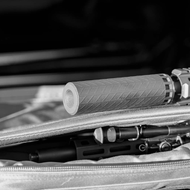Understanding the Difference Between a Silencer and a Suppressor
Nov 4th 2024
The terms "silencer" and "suppressor" are often used interchangeably, but are they really the same thing? If you’re new to the world of firearms or are considering purchasing your first suppressor, understanding the distinction—or lack thereof—can help clear up any confusion.
What Is a Silencer?
The term "silencer" was coined by Hiram Percy Maxim, who patented the first firearm suppressor in 1909. Maxim's device was officially marketed as the "Maxim Silencer," and the term has since been used to describe devices designed to reduce the sound of a gunshot. The name stuck, and even today, "silencer" is the term used in legal language, including in the National Firearms Act (NFA).
Key Takeaway:
- "Silencer" is the original term for what we now commonly call suppressors.
- The term remains widely recognized, especially in legal and regulatory contexts.
What Is a Suppressor?
The term "suppressor" more accurately describes the device's function: it suppresses the sound of a gunshot rather than completely silencing it. Suppressors reduce the noise, muzzle flash, and recoil generated when a firearm is discharged. This makes shooting more comfortable and helps protect your hearing, but it doesn’t make a firearm completely silent, as Hollywood often depicts.
Key Takeaway:
- "Suppressor" is a more technically accurate term used in the firearms industry.
- It emphasizes the reduction of sound rather than the elimination of it.
Silencer vs. Suppressor: Is There a Difference?
The simple answer is no—there’s no functional difference between a silencer and a suppressor. Both terms refer to the same device, and the distinction is largely one of semantics. Whether you call it a silencer or a suppressor, the purpose is the same: reducing the noise and recoil produced by firing a gun.
Why the Confusion?
- Legal Language: The term "silencer" is used in official documents, such as ATF regulations and the National Firearms Act.
- Industry Preference: Many manufacturers and gun enthusiasts prefer "suppressor" because it better describes the device’s function.
- Cultural Influence: Movies, TV shows, and video games often use "silencer," reinforcing its popularity among the general public.
How Do Suppressors Work?
Suppressors reduce noise by slowing and cooling the rapidly expanding gases that escape when a round is fired. They contain a series of baffles or expansion chambers that trap and redirect these gases, minimizing the sound and flash. However, they don’t completely eliminate the noise. Most suppressors reduce the decibel level of a gunshot by 20–35 dB, depending on the caliber and suppressor design.
Why Choose the Right Terminology?
While both terms are widely accepted, using "suppressor" when speaking with firearm enthusiasts or manufacturers may demonstrate a better understanding of the technology. However, when dealing with legal matters or paperwork, "silencer" is the correct term, as it aligns with federal regulations.
When to Use Each Term:
- Silencer: Use in legal or formal contexts, such as completing ATF paperwork or discussing NFA-regulated items.
- Suppressor: Use in casual conversations or when speaking with manufacturers and the firearms community.
Final Thoughts
Whether you call it a silencer or a suppressor, the functionality remains the same: reducing the sound and recoil of your firearm to enhance the shooting experience. While "suppressor" is technically more accurate, "silencer" continues to hold its place in legal and cultural contexts. Understanding the interchangeable nature of these terms can help you communicate effectively, whether you’re at the range or navigating NFA paperwork.
Ready to invest in a suppressor? Check out our lineup of high-performance suppressors, built to deliver unmatched sound reduction and durability.

